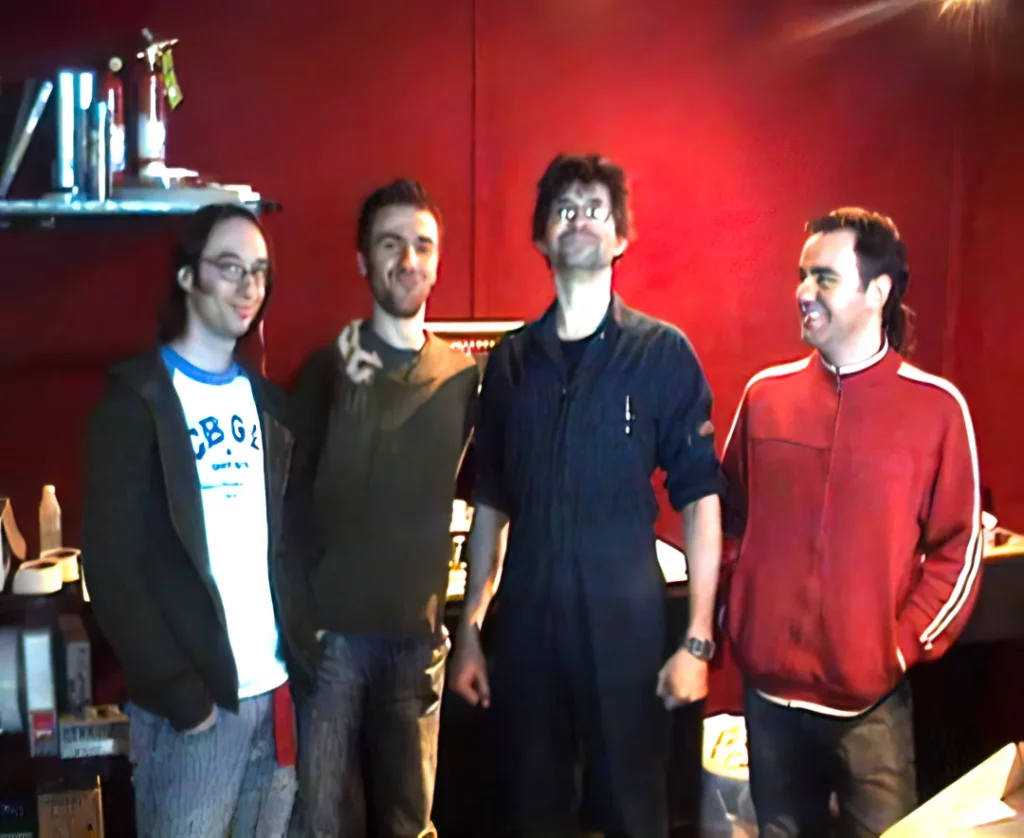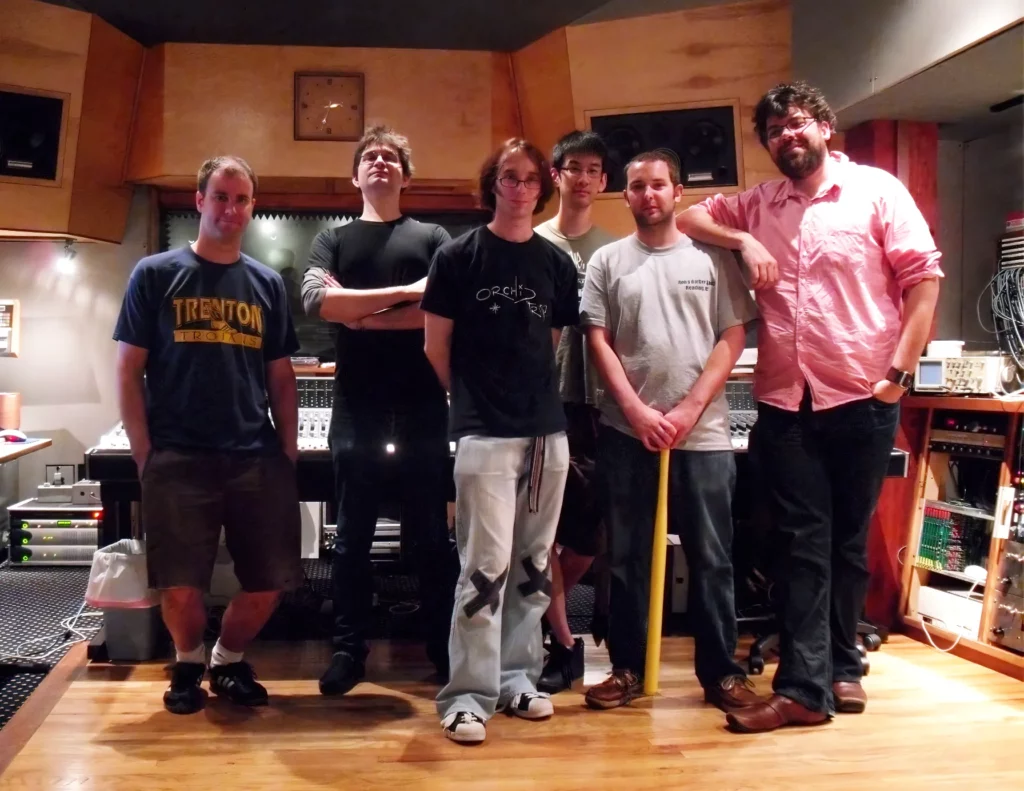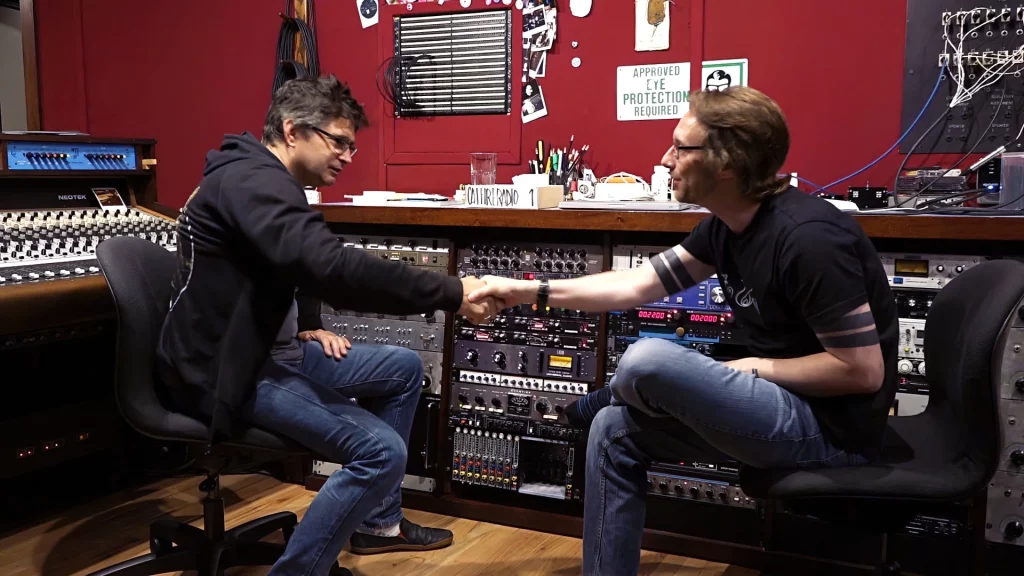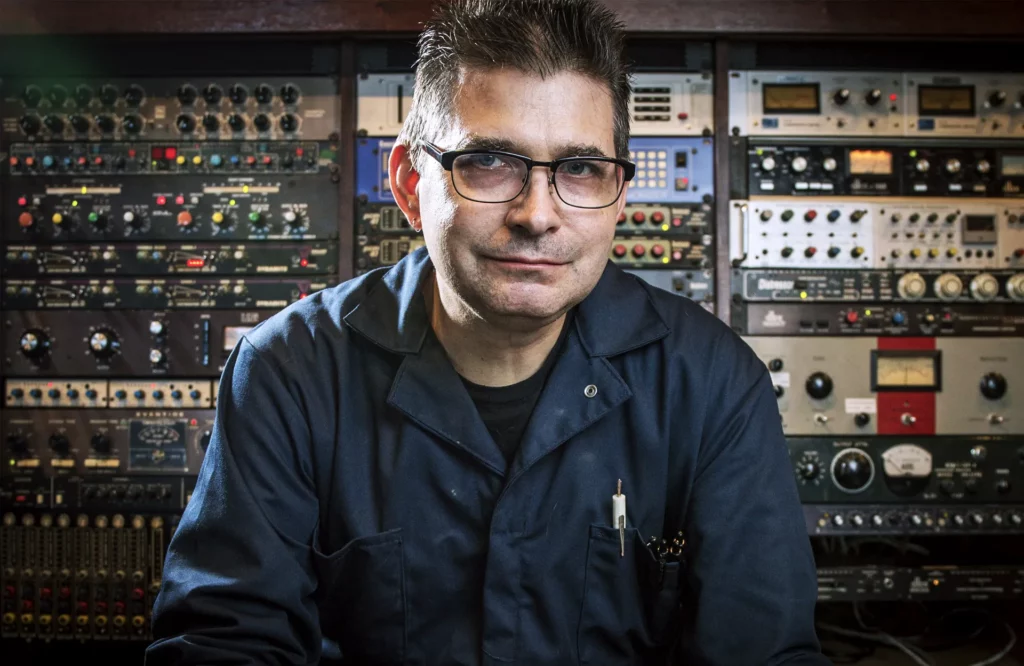For a few years in the mid-late 90s, “Steve Albini” was the disembodied name that arose in my mind only occasionally, when studying the sleeve of the album which remains to this day at my absolute apex of visceral, abrasive sonic excellence; Nirvana’s In Utero. I loved it then and I love it now. Primal, minimalist and ambient, it was the perfect marriage of band and sound. That such an artistic artefact should exist — an album featuring Kurt Cobain, Dave Grohl, and Steve Albini — is a cosmic phenomenon in which one stands humbled at the fleeting alignment of stars. But back then, all I knew of its production, aside from how unlike anything else it sounded, was crystallised by those modest few words inside the sleeve: “Recorded by Steve Albini”. Some time around the start of 2001, a friend of mine, as hungry for weird, abrasive, guitar-driven rock music as I was, brought a recently purchased CD over to my house, telling me “this is by the Nirvana guy — the one from In Utero”. I was of course intrigued. We sat rolling a joint on my bed while it played. It began:
Shellac of Noth America. Catalogue number TG211 CD. Audio compact disc. 44.1 kilohertz sample rate. 16-bit word length. Samples represented in 2’s-complement binary. 8 to 14 expansion. Set reproducer for reference level. 1000 Hurts.
As unusual an intro to an album as that was, the following two and a half minutes signified the beginning of a consciousness shift in my perception of recorded music. It took some time to fully realise what was taking place.Shellac – Prayer To God
To the one true God above, here is my prayer
Not the first you’ve heard, but the first I wrote
Not the first, but the others were a long time ago
There are two people here, and I want you to kill them
Her, she can go quietly, by disease or a blow
To the base of her neck, where her necklaces close
Where her garments come together, where I used to lay my face
That’s where you aught to kill her, in that particular place
Him, just fucking kill him, I don’t care if it hurts
Yes I do, I want it to, fucking kill him but first
Make him cry like a woman, no particular woman
Let him hold out, hope that, someone or other might come
Then fucking kill him, fucking kill him
Kill him already, kill him
Fucking kill him, fucking kill him
Kill him already, kill him
Fucking kill him, fucking kill him
Kill him already, kill him
Just fucking kill him, fucking kill him
Fucking kill him already, kill him
Ah, fucking kill him, fucking kill him
Kill him already, kill him
Kill him already, kill him already
Kill him, fucking kill him
Just fucking kill him, fucking kill him
Kill him already, kill him
Fucking kill him, kill him
Fucking kill him already, kill him
Kill him, fucking kill him
Kill him, just fucking kill him
Kill him already, kill him already
Kill him
Amen
The content of that music was difficult to process, and for a while I thought it was an absurdist joke. Laughing between ourselves over the next week or two, we dumbly sang the words “kill him, fucking kill him, fucking kill him…” in inane fashion, without proper recognition that what we had heard was, in fact, a work of artistic genius. I’m not sure exactly when the penny dropped, but I do remember, some years later, hearing Albini recount in an interview that, upon hearing the Ramones for the first time, he felt it was either the stupidest thing he’d ever heard, or the most awesome, eventually realising it was in fact the latter. One hopes that he would feel some semblance of emotion in the knowledge that, through a process of musical Darwinism, he had repeated that experience for a new generation.Shellac – Crow
Shellac – Didn’t We Deserve A Look At The Way You Really Are?
My friends and I had bought our tickets the day they went on sale, a diligence eventually repaid by the realisation that Albini’s chalet was just a few doors down from ours. We could see him through the window when we walked past, which we repeatedly did, unsubtly side-eyeing as we went, trying to catch a glimpse of our bespectacled hero. It was a matter of inevitability when, in the midst of a late-night drug and alcohol indulgence at our place, one of our new friends suggested I knock on Steve’s door and give him a CD of my music, which we had just been listening to. It seemed like an opportunity not to be missed, despite the fact that the benefit of doing so couldn’t be directly identified. And so, my friend and I, both high on a cocktail of MDMA and alcohol, looking like a pair of complete twats, him in his chef whites and hair tied up in bunches, and me in pyjamas, painted fingernails and eyes like saucers, walked nervously to Albini’s front door, at 2am. I knocked. He answered. Two idiots stood at the door. “Hi Steve… um… we’re from the room just over there and I was just walking by, and… um… well, I saw you through the window, and… well…” “Were we making too much noise?” he said. “Oh God, no! Not at all! I just… I mean… I saw you here, and I hope you don’t mind, but I couldn’t miss the opportunity to give you this…” I handed over my CD, with its handwritten cover. I don’t remember much of a follow-up conversation. Steve looked bemused at the two inebriated adolescents in front of him, but nevertheless accepted my gift, shook us both by the hand, and thanked us. When the door closed we made our way back to our chalet, deeming the experience something like a small success, slightly dying inside from the trauma of actually going through with it, but returning to our party as newly formed heroes, regaling our friends with tales of our travels, to cries of “what was he like?” and “I can’t believe you fucking did it!” Neither could I.
I’m only interested in working on records that legitimately reflect the band’s own perception of their music and existence. If you will commit yourselves to that as a tenet of the recording methodology, then I will bust my ass for you. I’ll work circles around you. I’ll rap your head with a ratchet.
As he was in prose, so he was in life. The only reason that regular Joes like us, from the arse-end of nowhere, could even entertain the notion of working with an engineer of his calibre, many high-profile albums deep into his professional career, was because he intentionally made it possible for us to do so. His entire business model centred around the notion that you didn’t have to be a privileged member of some elite class to afford his services. Independent artists were not to be shut out of the arena for their lack of market potential, but welcomed in, adorned with fluffy coffees and never told to keep their feet off the furniture. He lived by his principles, and was true to his word, and to aspiring noise-makers like us, those words were gospel. Over the ensuing years I hungrily consumed every word of his I could find, whether in print or on YouTube videos. I wrote essays about him for my Music Production degree, and as I began developing my own career as a sound engineer, I modelled my practices on all that I had learned from him. His various lectures about his approach to recording resonated strongly with me, and I easily adopted many of his principles when approaching my recording sessions, out of an obvious necessity to respect the artistic vision of those for whom I was being hired to work. Again, from his letter to Nirvana:Most contemporary engineers and producers see a record as a “project,” and the band as only one element of the project. Further, they consider the recordings to be a controlled layering of specific sounds, each of which is under complete control from the moment the note is conceived through the final mix. If the band gets pushed around in the process of making a record, so be it; as long as the “project” meets with the approval of the fellow in control.
My approach is exactly the opposite.
I consider the band the most important thing, as the creative entity that spawned both the band’s personality and style and as the social entity that exists 24 hours out of each day. I do not consider it my place to tell you what to do or how to play. I’m quite willing to let my opinions be heard… but if the band decides to pursue something, I’ll see that it gets done.
I like to leave room for accidents or chaos. Making a seamless record, where every note and syllable is in place and every bass drum is identical, is no trick. Any idiot with the patience and the budget to allow such foolishness can do it. I prefer to work on records that aspire to greater things, like originality, personality and enthusiasm.
In embodying these principles, Steve Albini demonstrated an unwavering dedication to the artistic vision of the bands he worked with, and his refusal to compromise on integrity set a standard that continues to inspire independent artists and producers alike. Through his candid writings, cast-iron work ethic, and steadfast commitment to artistic freedom, he leaves behind a legacy that transcends the music he worked on, exacting a profound influence via the power of authenticity, resilience, and the pursuit of artistic excellence.
When I returned to Electrical Audio for the final time in 2017, it was as much a personal journey that I had to make for myself as it was an effort to reinforce my understanding of how to achieve that amazing drum sound, and to make my little video about it. I knew I needed to go back, one final time, and look Steve in the eye. This visit felt like closing a chapter that had remained unfinished. My previous experience had left a lasting impression, and I needed to confront those lingering feelings of inadequacy and fear. As I walked through the familiar doors of the studio, memories of my internship flooded back. But this time I was armed with years of experience, and a sense of confidence that had been hard-won through a path that I had been treading at my own studio back home. As I awaited the beginning of our two-day drum session, a mix of emotions swirled within me, marked largely by intense anxiety at the thought of confronting him again. I introduced myself, reminding him of my internship years ago. He remembered. Discussing the techniques and nuances that create the distinctive sound I admired so much was enlightening. This time, our conversation was on more equal footing. I wasn’t the anxious intern seeking approval; I was a fellow professional, eager to learn and share insights. While Steve’s manner remained brusque, this time I felt pride in the persistence and passion that had brought me back, all these years later. In the end, making the video and revisiting the studio wasn’t just about capturing that iconic sound. It was about facing my fears, reclaiming my narrative, and validating my journey. As I packed up my equipment and prepared to leave, I felt a sense of closure. The chapter was finally complete, and I walked away with not just technical knowledge, but a deeper understanding of myself and the resilience it takes to pursue one’s dreams.

In the years since, I have grappled with conflicting feelings about Steve Albini, ultimately coming to view him as something of a contradiction. Though I remain a strong admirer of his work, his approach and his razor-sharp intellect, I am also troubled by his stubbornly myopic perspectives on that which he so articulately pronounces. I found this deeply at odds with his apparent commitment to scientific empiricism and rationality. It’s this tension between his reputation as a rational thinker and some of his more dogmatic views, combined with my personal experiences with him, that has led me to somewhat reassess my perception of him. While I continued to admire his talent and his uncompromising dedication to his craft, I came to recognise that even the most brilliant minds are not immune to biases or blind spots. Steve liked to frame his arguments as existing in a paradigm of ideological warfare. Us versus them. You’re either an ally or you’re an enemy. This was a mentality that seemed to permeate much of his discourse, and his art seemed well served by it. But for me, as I became more aware of moral philosophy as an intellectual discipline, as I absorbed more and more perspectives from a diverse range of vantage points, and as I became more awakened to the necessity of debate as the lynchpin of scientific inquiry, I began to feel that the arguments put forth by Albini on many issues were not only overly simplistic but also often needlessly divisive. While his passion and conviction are admirable, I couldn’t help but feel that his black-and-white world-view failed to fully appreciate the complexities and nuances inherent in many social, cultural, and political issues. Take for example his famous email to London-based EDM producer, Oscar Powell, in 2015, who reached out seeking permission to use a vocal sample from Big Black for an upcoming single on his label, XL Recordings. Powell expressed deep admiration for Big Black’s music, sharing links to some of his previous tracks. This was Steve’s reply:
Hey Oscar.
Sounds like you’ve got a cool thing set up for yourself. I am absolutely the wrong audience for this kind of music. I’ve always detested mechanized dance music, its stupid simplicity, the clubs where it was played, the people who went to those clubs, the drugs they took, the shit they liked to talk about, the clothes they wore, the battles they fought amongst each other…
Basically all of it: 100 percent hated every scrap.
The electronic music I liked was radical and different, shit like the White Noise, Xenakis, Suicide, Kraftwerk, and the earliest stuff form Cabaret Voltaire, SPK and DAF. When that scene and those people got co-opted by dance/club music I felt like we’d lost a war. I detest club culture as deeply as I detest anything on earth.
So I am against what you’re into, and an enemy of where you come from but I have no problem with what you’re doing. I haven’t bothered listening to the links, mainly because I’m in a hotel with crappy internet at the moment but also because it probably wouldn’t be to my taste and that wouldn’t help either of us.
In other words, you’re welcome to do whatever you like with whatever of mine you’ve gotten your hands on. Don’t care. Enjoy yourself.
Steve





10 responses
What a beautiful, raw honest tribute! – A profound gift here…one in which you have emerged and grown so deeply..oxygenating deeper states of mind..thus nurturing ethical intelligence, integrity..courage, humility and understanding. – letting all of these experiences move through you over the years! The shadow sides..hiding in the caves and crevices, always essential for real creativity. You held that vision.. The Third Circle of Reciprocity! – deep bow for this. Deep bow to him, the fragrance of freedom was found x
18.8.24 1032am i never saw him as a Buddhist type who would have bothered to acknowledge this kindda response. probably a man twisted by feminine wiles, though… good luck is all i can say…. in relation to wherever he is… i never trusted those who relied on reciprocity as a what goes around comes around guide to easy living – an asiatic nonsense regards dealing with the guilt trip as induced by you who dish out vengeance. glad you liked the fella, though. a fair few can attest to dingy apartments listening to the man and the rest of the political piggies – from killdozer to jesus lizard to laughing hyenas… whoever undertook the buy every record produced or engineered by albini schtick will have a great time of it and an eclectic collection of songs to mess with… we all recall the first breeders album, don’t we? and everyone loves the surfa rosa album… surely? did he have anything to do with the bogblast 7inch ep? you might know….. regards jps
Fucking hell James, that was interesting and possibly the longest thing I have read this year
Thanks mate – yeah I know. And that was the edited version!
18.8.24 1021am
delon has allegedly died and albini went before him. i mean, I never believe these news stories as…
a fine time was had by folk listening to him in the late 80’s and early 90’s. his original fan base probably having left after hearing all they wanted to hear. big black sampled beyond belief, allegedly. i aint gettin’ into those arguments…
i don’t really have any innate thoughts on albini, other than to reiterate the same old b.s. that: he was eager to garner some semblance of a reaction, whether that was due to band monikers, topic of conversation (in the way of composition) or whichever mic and amp he used to aid him with his signature engineer sound (as processed in the house that dripped blood).
anyone taking an interest thus far into the career of the man will know what the usual conversations consist of re: his oeuvre (pron: eeeeeeeerv).
a good man. sonically so. and after just having a shower i would say go off your instinct.
…though we do know that one never puts one’s trust in musicians, authors, poets, film stars porn stars, journalists..
if it wasn’t for kraftwerk and the knack this guy wouldn’t have bothered.
even the font for this site reminds me of albini
regards
jps
Excellently written, and I agree that the technical prowess and empirical intelligence only gets one so far in life. Empathy, humility and emotional intelligence are equally important, especially in regards to the overall human experience and art as a central expression of that experience.
I really enjoyed this. We’re of a similar age/generation, similar foundational influence of “In Utero” and similar mix of admiration/appreciation and confoundedness with Albini. With the admiration and appreciation coming from his work, his technical ability, his unique thoughts and insights on recording, music itself and his peer’s bands and their journey through the industry disruption of their “scene” in the late 80’s through the late 90’s and especially how available of a resource he often was (answering emails to strangers regarding recording techniques, sending them detailed diagrams, making himself available to many an interview with creators with only a marginal presence/viewership etc.) to those seeking his wisdom (especially when not in person where he seemed to lose interest). Then there was the other half that you very eloquently spoke on. Which I think for the sake of some brevity was summed up best when you said “even the most brilliant minds are not immune to blind spots and biases” and Steve, in his humanity, certainly held a substantial mix of brilliance, blind spots and biases. His rigid socio-political bent certainly was in no small part a product of him being a Gen-X’er who came up in and remained deeply embedded in the underground DIY/independent experimental “rock”/punk music scene in the United States. It’s one that for quite some time has – for better or worse – been hijacked by ideologues and precepts that often have little to do with music and community. It’s immediately clear to anyone who wants to navigate and operate in that particular artistic milieu that you are best suited to quickly and dogmatically assume and espouse a particular set of socio-political tenets. Lest you be rapidly ostracized and often, fiercely denounced and demonized and find that most, if not all of the available channels to access (gigs, networking, distribution etc.) are shut off to you. So, it becomes easy for your “blind spots and biases” to compound as you get lost in its self-enforcing echo chamber. Especially if you are able to carve out a life and career for yourself in it and from a young age your id/ego is reinforced by the in group as they celebrate your (pre-approved) rhetoric and begin to hold you up as a bastion of their ethics, canon and credo. Even the sharpest of us would be unable to spot incongruencies or notice how – as you mentioned – myopic and lacking of insight into the broader world that exists outside of yours. It doesn’t make Albini any “less.” In a way it makes him more interesting and worthy of examination as we find a way to improve ourselves, our generation and our world by being able to identify and take the worthwhile parts of things and synthesize it into our own manner of being. Instead of continuing to be caught up in the “us verses them” trap that the “powers that be” thrive on. Not caring which “side” of the argument we pick, so long as we pick one and remain insistent in it because they have the resources to operate behind the veil of either flawed, incomplete and (most importantly) divisive system of thought and existence. Anyway, apologies if I’ve irritated anyone with this rant. It certainly wasn’t my intention. RIP Steve Albini. I wish I hadn’t waited to work with you in Chicago but I sure do thank him for how accessible he was otherwise so we can now share in and make use of his wisdom. Certainly a fascinating person and professional. My sincerest condolences to his wife, family and friends.
Thanks for taking the time to write your beautiful ramble. I likewise enjoyed it. Binary thinking in a complex world is a fool’s errand, and I greatly admire anyone willing to shine a torch through the fog and take the time to examine and appreciate the many things they find. ♥️
Hi James, I stumbled upon this blog after getting a YouTube recommendation for your 2017 drum tracking video, and I wanted to share that I absolutely loved it. It’s such an amazingly written, personal, vulnerable and genuinely eye opening read man. I appreciate you sharing. Also, thank you for taking the time, effort and (probably immense) expense to create such a comprehensive video on his recording techniques.
As an aside, I wanted to ask you what you thought about Steve’s take on digital recording and its longevity? Undoubtedly analog has its merits in a technical and practical sense, but it feels unfair that it was essentially written off by him during his career. I’m curious what your perspective is as an engineer.
Thank you!!
(Also one last question lol, when Steve was recording to tape in the video, did you keep or use the reels after? From my understanding everything was sent from the console to your digital recording setup during tracking, but I may be missing something.)
Hey man, thanks for your lovely comment. I really appreciate it. Both the video and the post were my pleasure to create.
On digital vs analogue recording — that is a can of worms you’re opening there. I have many thoughts about that topic, so much so that I think you’ve just inspired me to write a new blog post about it. I once sent Steve an email asking him to clarify his take on it, and I got a characteristically verbose tirade in response, so I will add that to my post and then discuss it at tedious length. But yes, in essence, I basically agree with you, with about 40 caveats. Sign up to my mailing list to get notified when I have written it.
And the tape? Oh yes – I have it! It’s stored in my cellar, alongside the two reels from my band’s recording with him in 2008. If you want to hear a direct comparison between the tape recording and the digital recording, feel free to knock yourself out with that here.